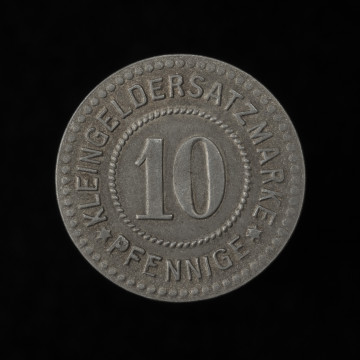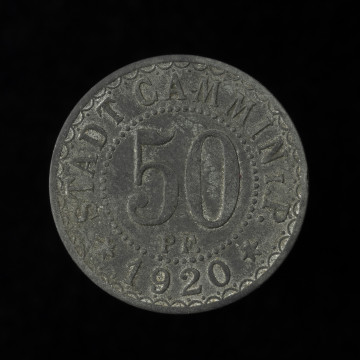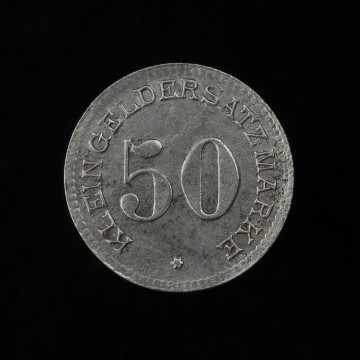
10 pfennig
1918
National Museum in Szczecin
Part of the collection: Scrip
Small purchases of daily necessities made in limited quantities called for small coins. This money, formerly usually minted in silver, tended to disappear from circulation during political or economic turmoil. Indeed, this is what happened in Germany, when the population hoarded coins minted in common metals during the final phase of the First World War. Low denominations represent the backbone of retail trade. In their absence, minor trade ceases to exist or takes the form of a primitive barter of goods, very burdensome for the population. No wonder, then, that local authorities, anxious to await shipments of small coins from the Reich Bank, tried to deal with the problem themselves. A resolution to issue replacement money was also passed by the town council of Kamień Pomorski. In 1918 and 1920, the council issued two series each of 10 and 50 pfennig coins struck in iron and zinc. Remarkably, in 1918 the 50 pfennig denomination coin was struck as a fraction, i.e. ½ mark. These coins were also issued in two variants: with the full name of the denomination MARK printed in small letters below the fraction, exactly as on the featured coin, and with the abbreviation Mk in capital letters next to the fraction. Many varieties of ½ mark coins stamped in iron are known, reflecting, on the one hand, the demand for this denomination and, on the other hand, the poor quality of the stamps, deteriorating when exposed to the hard metal. The money was produced by Wilhelm Mayer & Franz Wilhelm of Stuttgart. Although we do not know the vast majority of replacement coin makers, in the case of the Kamień coins it is believed that the initials C.V. found on the reverse under the coat of arms stand for the author of the stamps, Carl Viedt from Kamień Pomorski. Mieszko Pawłowski
Other names
1/2 Mark (50 Pfennig), Notgeld
Author / creator
Object type
token coin
Technique
coining
Material
zinc
Origin / acquisition method
purchase
Creation time / dating
Creation / finding place
Owner
Muzeum Narodowe w Szczecinie
Identification number
Location / status

1918
National Museum in Szczecin

1920
National Museum in Szczecin

1901 — 1925
National Museum in Szczecin
DISCOVER this TOPIC
Castle Museum in Łańcut
DISCOVER this PATH
Educational path